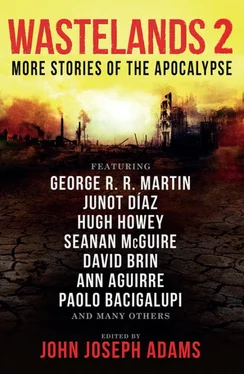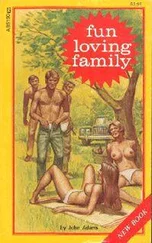“I’m Jimmy,” said Jimmy. “Welcome to my roadside café.”
The man glanced over at the shack. “Is this a joke?”
“No,” said Jimmy, and he frowned. “Is what a joke?”
The man took in Jimmy’s uniform: the carefully pressed chinos, the long white apron, the little tie. The nametag. He said: “Why aren’t you dead?”
“Can I interest you in a donut?” said Jimmy. “On the house, of course.”
“What are you, crazy? Are you out of your fucking mind?”
“No,” said Jimmy. A shadow of uncertainty flickered across his face. “We have brandy, too.”
The man snorted, and picked up his pace. He was leaving. Jimmy felt a thrill of panic. He said: “You have lovely children.”
The man stopped, dropped the wagon’s handle, and, in one fluid motion, spun around and slammed his fist into the center of Jimmy’s face. Jimmy heard his nose crack, and the world went dark. When he came back to it, he was on the street, and the man was straddling his chest, hitting him and hitting him. Every blow was seismic, the pain monstrous, and then incomprehensible. A gentle thrill of peace passed through Jimmy’s body. He felt sure that he would die soon.
And then there was a voice, low and rasped, barely audible. The man paused, and looked over at the café. Margaret stood framed by the slanting doorway, stooped and leaning against the wall, wrapped tightly in Jimmy’s blanket.
He looked back. “Is that your wife?”
Jimmy swallowed the blood in his mouth, licked the blood off his lips. “No,” he said. “That’s Margaret.”
“Margaret,” said the man, and, after a moment, planted a hand on either side of Jimmy’s body and pushed himself to his feet. He wiped the sweat out of his eyes, bent and offered his hand.
Jimmy took it. His left eye was already swollen shut, and he thought that one of his cheekbones might be broken. He swayed for a moment, waiting for the dizziness to pass. “Can I offer you some brandy?” he said, spitting out a tooth. “On the house, of course.”
* * *
The man’s name was Patrick Cramer. He’d moved to New York with his wife a year before the plague, and was on his way back to Florida now.
“New York was my wife’s idea,” he said. “She wanted the kids to grow up in a city. Museums and plays and culture and shit. But we never got around to any of that, so it was just a really expensive place to live in a really small apartment.”
They were sitting outside the café, all of them. Margaret had begun screaming during the night, so Jimmy gave her a couple of doses of morphine, which had done wonders. Even though it was only temporary, he was glad to see her better, smiling, her face a lovely echo of what it had been before the plague.
Jimmy had gone scavenging the day before, and came back with two more lawn chairs and a bag of beef jerky, teriyaki-flavored. They were eating the jerky now, Jimmy tearing it into thin strips for Margaret to swallow. She couldn’t chew very well anymore; her teeth were coming loose, swimming uncertainly in the pink soup of her gums.
“I went to New York City once,” said Jimmy. “I was seventeen. We were going to look for prostitutes, me and my friends.”
“Did you find any?” said Margaret, smiling.
Jimmy nodded. “Lots of them. Big ones and small ones, fat ones and thin ones.”
Margaret laughed. “They sound like they’re from Dr. Seuss.”
“Horton Humps a Whore,” said Patrick.
“I chickened out, though. I went to a diner and waited for my friends to get done. That’s where I met my wife.”
“I have to tell you, Jimmy,” said Margaret, still smiling, “that isn’t the most romantic story I’ve ever heard.”
“‘I met my wife that night I couldn’t find any hookers,’” said Patrick, and chuckled quietly to himself. The wagon with his children in it was parked close by, under a cloud of flies.
Jimmy said: “For me, the best thing about New York was the crowds. Lots of people don’t like that, the crush, but I loved it. It’s hard to be alone in New York.”
Patrick snorted. “Easy to be lonely, though.”
“Oh, you can be lonely anywhere. I’d rather be lonely in a crowd.” He squinted off into the distance. “I liked the hot dogs, too. Is that a hawk?”
Margaret shaded her eyes and looked westward, into the diffuse light of evening. “An osprey, maybe?”
“I don’t think there are any ospreys in this part of Maryland. Mostly they live around the bay.”
“It’s a fucking bird ,” said Patrick, without malice.
“My husband was really crazy about birds,” said Margaret, still squinting at the wheeling speck in the distance. “We were going on a birding vacation next month. To California.”
“Hunting?”
“No. Just looking.”
Patrick stared at her. “Seriously? You drive around looking at birds?”
“No. My husband drives around looking at birds. I stay at the hotel and get massages.” She glanced at Patrick, caught him rolling his eyes. “So what do you do for fun?”
“Make money.”
“That’s all?”
He considered. “Spending money is okay too, I guess. But it’s just the cigarette afterwards, you know?”
“No,” said Margaret. “I don’t. I like that cigarette.”
“They’ll kill you,” said Patrick, too quickly to stop himself.
Jimmy frowned. He’d been enjoying the conversation, but he didn’t much like the uncomfortable silence it had become. He said: “My favorite thing about California is the sunsets.”
Margaret closed her eyes, and Jimmy saw her eyelids flutter with a spasm of pain. “That’s what I wanted to do most of all,” she said. “Watch the sun setting over the Pacific.” She paused. “My husband was on a business trip, down in Texas. Do you think the plague got down there too?”
Jimmy got up, and said: “Let me get you some more brandy.” He disappeared into the café. The sounds of bottles clinking together came faintly from the open doorway.
“Man doesn’t talk about what he doesn’t want to talk about,” said Patrick, after a moment.
Margaret managed a grin, and bundled herself tighter into her blankets, and stared off into the west.
* * *
The next morning dawned bright and crisp, alive with bird chatter. Leaves rustled gently against each other in a clean autumn breeze. Jimmy bent over Patrick and shook him gently, whispered: “Time to get up.”
Patrick opened his eyes, blinked. The air inside the café was close and warm, faintly redolent of decay. He craned his head back and glared. “Who says?”
Jimmy held up a shovel, and smiled. “Come on,” he said, and went outside.
Patrick groaned, then struggled cursing out of his sleeping bag and went to the window and looked out at his children, still in their wagon, drawn up against the side of the café and covered now with a burlap tarp. When he turned back, Margaret was staring at him with wide and bleary eyes, her head turned sideways against the cot. It seemed detached, somehow, a separate thing laid down beside her body.
“Hundreds of them,” she whispered. “Thousands.”
Patrick blinked. “What?”
“They’re made of eyes. Just mouths and eyes, floating around like newspaper. Everywhere. There’s nothing they won’t eat.” She paused and drew a long ragged breath. “They’re so hungry.”
“Jesus fuck,” said Patrick, a shiver crawling up his spine. He inched sidelong to the doorway and out into the open air. Jimmy was waiting for him. “I think Margaret’s lost it,” he said.
“Not yet,” said Jimmy. He held out a shovel. “We’d better get started, while it’s still cool out here.”
Читать дальше












